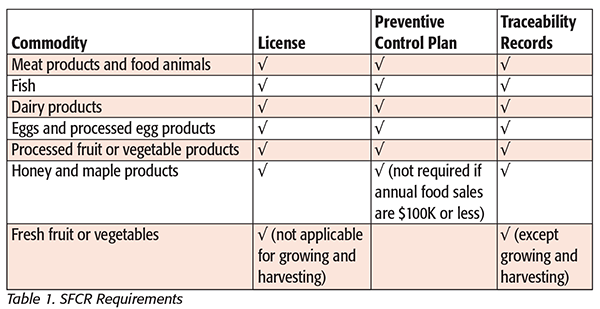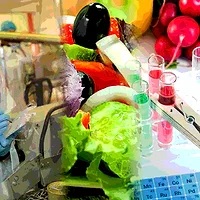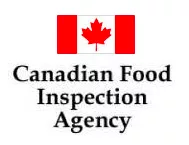The Safe Food for Canadians Regulations: What This Means for the Food Industry

On January 15, 2019, the Safe Food for Canadians Regulations (SFCR)[1] came into force, marking a significant milestone in food safety for Canada. These regulations make Canada’s food system even safer by focusing on prevention and allowing the faster removal of unsafe food from the marketplace.
For the food industry, the new regulations reduce the administrative burden on businesses by replacing 14 sets of regulations with 1 and will help maintain and grow market access for Canada’s agri-food and agricultural sectors.
The following are some highlights and key information to help industry understand next steps, now that the new regulations are here.
What businesses need to know about the SFCR
On January 15, 2019, the Canadian Food Inspection Agency (CFIA) began to enforce the SFCR. The regulations include key new requirements related to licensing, traceability, and preventive controls, which apply to businesses that import food into Canada or prepare food in Canada for export markets or to be sent across Canadian provincial or territorial boundaries.
Most businesses with more than $100,000 in gross annual food sales must prepare and maintain a written preventive control plan. Some requirements had to be met immediately upon coming into force on January 15, 2019, while others are being phased in over a period of 12–30 months based on food commodity, type of activity, and business size.
If a business has a previous food registration or license with the CFIA, and it expires after January 15, 2019, it will remain valid as a Safe Food for Canadians (SFC) license until its expiry date, provided there is a statement on it indicating that it is also a license issued under the Safe Food for Canadians Act. As expiration approaches, the business will be required to apply for an SFC license.
Some businesses are affected immediately
In general, the new regulations apply to sectors previously required to be registered or licensed with the CFIA if they conduct any of the following activities:
• Import food
• Export any food that requires an export certificate or Certificate of Free Sale
• Manufacture, process, treat, preserve, grade, package, or label food to be exported or sent across Canadian provincial or territorial boundaries
• Slaughter food animals from which meat products are derived for export or to be sent across Canadian provincial or territorial boundaries
• Store and handle a meat product in its imported condition for inspection by the CFIA
By consulting Table 1, such businesses can determine whether the requirements related to licensing, preventive control plans, and traceability apply to them starting January 15, 2019.
Businesses can access the CFIA’s interactive tools and sector-specific timelines[2] for more detailed information on which requirements apply to them and when, based on the activities they conduct.
Some businesses have more time to meet requirements
Food sectors that were not required to be registered or licensed with the CFIA in the past will only need to meet new licensing, preventive control, and traceability requirements in 2020 or 2021, unless they require an export certificate or Certificate of Free Sale for food that they export. This includes businesses in the following sectors, among others:
• Confectionary
• Snack foods
• Beverages
• Oils
• Dried herbs and spices
• Nuts and seeds
• Coffee and tea
• Baked goods, cereals, and pasta
For more information, consult the timeline that applies to these businesses.[3]
What businesses need to do if affected right away
Businesses affected by the new requirements on January 15, 2019, should now have their license. If not, they should enroll in My CFIA[4] and apply for one or more licenses immediately. Each SFC license costs $250 and is valid for 2 years. When applying for a license, businesses will need to declare that they have the necessary preventive controls and preventive control plans in place, where required.
The CFIA website has much information to help businesses, including what to consider before applying for a license,[5] a Handbook for Businesses,[6] and interactive tools and other plain-language resources on general and commodity-specific requirements available in the toolkit for businesses.[7]
Entry of imported food certified before the SFCR
During the transitional phase immediately following January 15, 2019, the CFIA is following the usual process for admitting imports of food at the border and is not preventing the clearance of shipments based on the new regulations.
Requirements for Canadian food exporters
Businesses that require an export certificate including a Certificate of Free Sale from the CFIA to export products need to apply for and obtain an SFC license. These businesses will then be included on the SFC License Registry, which will confirm that they are operating in good standing and will help them maintain access to key markets, including the United States.
By 2022, the license requirements will apply to all food businesses that manufacture, process, treat, preserve, grade, package, or label a food in Canada for export. Businesses that export food but do not produce the food, such as export brokers, will need a license only if they require an export certificate. More information is available in the CFIA’s guidance on food exports.[8]
Approach to enforcing the new regulations
The CFIA recognizes that the SFCR introduce a number of new requirements for food businesses. To balance the need to protect Canada’s food safety system while supporting food businesses in their efforts to comply with the new regulations, the CFIA’s enforcement approach emphasizes working with businesses to help them understand the new requirements.
Enforcement actions, where applicable, are proportionate to the food safety risk and the seriousness of the noncompliance. Factors such as potential or actual harm, compliance history, and intent are being taken into consideration. More information on enforcement is available at inspection.gc.ca/safefood.
The CFIA worked closely with industry during the development of the SFCR and is actively engaging with businesses and industry associations to help businesses meet the SFCR requirements. The agency has a strong history of working with industry and is committed to continuing this cooperation, so as to ensure the successful implementation of this significant improvement to food safety in Canada.
Lyzette Lamondin is the executive director of Food Safety and Consumer Protection at the CFIA. She led the initial development, drafting, and engagement for the SFCR from 2013 to 2015. She currently oversees the implementation of the new regulations.
References
1. inspection.gc.ca/food/sfcr/eng/1512149177555/1512149203296.
2. inspection.gc.ca/food/sfcr/timelines/eng/1528199762125/1528199763186.
3. inspection.gc.ca/food/sfcr/timelines/all-other-foods/eng/1527610633553/1527610633758.
4. inspection.gc.ca/about-the-cfia/my-cfia/eng/1482204298243/1482204318353.
5. inspection.gc.ca/food/sfcr/general-food-requirements-and-guidance/licensing/obtain-a-licence/eng/1543359915240/1543360663242.
6. inspection.gc.ca/food/sfcr/toolkit-for-businesses/handbook-for-food-businesses/eng/1481560206153/1481560532540.
7. inspection.gc.ca/food/sfcr/toolkit-for-businesses/eng/1427299500843/1427299800380.
8. inspection.gc.ca/food/sfcr/exports/eng/1323723342834/1323723662195.
Looking for quick answers on food safety topics?
Try Ask FSM, our new smart AI search tool.
Ask FSM →








